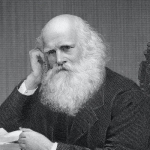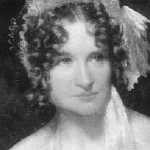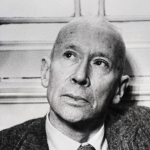I wake and feel the city trembling.
Yes, there is something unsettled in the air
And the earth is uncertain.
And so it was for the tenor Caruso.
He couldn’t sleep—you know how the ovation
Rings in your ears, and you re-sing your part.
And then the ceiling trembled
And the floor moved. He ran into the street.
Never had Naples given him such a reception!
The air was darker than Vesuvius.
“O mamma mia,”
He cried, “I’ve lost my voice!”
At that moment the hideous voice of culture,
Hysterical woman, thrashing her arms and legs,
Shrieked from the ruins.
At that moment everyone became a performer.
Otello and Don Giovanni
And Figaro strode on the midmost stage.
In the high window of a burning castle
Lucia raved. Black horses
Plunged through fire, dragging the wild bells.
The curtains were wrapped in smoke. Tin swords
Were melting; masks and ruffs
Burned—and the costumes of the peasants’ chorus.
And sank in the Pacific. The tremors
Passed under the waves. And death rested.
2
Now, as we stand idle,
Watching the silent, bowler-hatted man,
The engineer, who writes in the smoking field;
Now as he hands the paper to a boy,
Who takes it and runs to a group of waiting men,
And they disperse and move toward their wagons,
Mules bray and the wagons move—
Wait! Before you start
(Already the wheels are rattling on the stones)
Say, did your fathers cross the dry Sierras
To build another London?
Do Americans always have to be second-rate?
Wait! For there are spirits
In the earth itself, or the air, or sea.
Where are the aboriginal American devils?
Cloud shadows, pine shadows
Falling across the bright Pacific bay ...
(Already they have nailed rough boards together)
Wait only for the wind
That rustles in the eucalyptus tree.
Wait only for the light
That trembles on the petals of a rose.
(The mortar sets—banks are the first to stand)
Wait for a rose, and you may wait forever.
The silent man mops his head and drinks
Cold lemonade. “San Francisco
Is a city second only to paris.”
3
Every night, at the end of America
We taste our wine, looking at the Pacific.
While we were waiting for the land
They’d finished it—with gas drums
On the hilltops, cheap housing in the valleys
Where lives are mean and wretched.
But the banks thrive and the realtors
Rejoice—they have their America.
Still, there is something unsettled in the air.
Out there on the Pacific
There’s no America but the Marines.
Whitman was wrong about the People,
But right about himself. The land is within.
At the end of the open road we come to ourselves.
Though mad Columbus follows the sun
Into the sea, we cannot follow.
We must remain, to serve the returning sun,
And to set tables for death.
For we are the colonists of Death—
Not, as some think, of the english.
And we are preparing thrones for him to sit,
Poems to read, and beds
In which it may please him to rest.
This is the land
The pioneers looked for, shading their eyes
Against the sun—a murmur of serious life.





















Comment form: